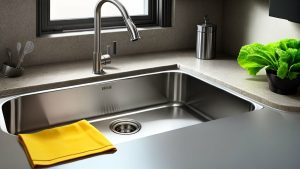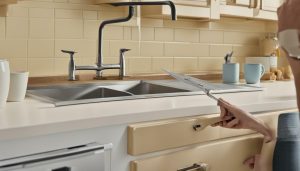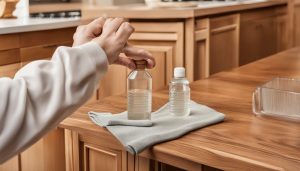Having a double sink in the kitchen can be convenient for cooking and cleaning, but it can also be a pain when it becomes clogged. A clogged sink can slow down your daily routine and cause unpleasant odors in the kitchen. It’s important to keep your kitchen sink clear of clogs to maintain a healthy and functional plumbing system.
If you’re experiencing a clogged double sink, don’t fret! We’ve put together an easy step-by-step guide to help you unclog your double sink in no time. In this guide, we’ll cover the common causes of clogs, the necessary tools and materials, and preventive measures to avoid future clogs. We’ll also provide troubleshooting tips for stubborn clogs and address common mistakes to avoid when unclogging your double sink.
Key Takeaways:
- Double sink clogs can cause unpleasant odors and slow down your daily routine.
- Regular maintenance and proper disposal practices can help prevent clogs.
- A plunger, pipe snake, baking soda, vinegar, and hot water are effective tools for unclogging a double sink.
- Preventative measures can help avoid future clogs.
- Knowing when to call a professional plumber is important for recognizing more serious plumbing issues.
Understanding the Common Causes of Double Sink Clogs
Dealing with a kitchen sink clog can be an unpleasant and frustrating experience. To avoid this, it’s important to understand the common causes of double sink drain unclogging so that you can take steps to prevent them from happening.
Food Particles
The most common cause of a double sink clog is food particles. Even if you have a garbage disposal, small food particles can still accumulate and cause a blockage. Over time, these particles can build up and create a stubborn clog that is difficult to remove.
Grease and Oil
Grease and oil are another common cause of double sink drain unclogging. When you pour grease or oil down the drain, it can solidify and create a blockage. Over time, this can lead to a buildup of grease and oil that is difficult to remove.
Soap Residue
Soap residue can also contribute to a double sink clog. Over time, soap residue can build up in the drain and create a blockage. This can be especially problematic if you have hard water, which can cause soap to build up more quickly.
Other Substances
Other substances can also cause a double sink clog. These may include coffee grounds, eggshells, and other items that should not be placed in the sink drain. Foreign objects such as utensils and non-food items can also cause blockages in the drain.
By understanding the common causes of double sink clogs, you can take steps to prevent them from happening. Regular maintenance and proper disposal practices are key to keeping your kitchen sink clear and flowing smoothly. In the next section, we’ll look at the tools and materials you’ll need to DIY unclog double sink.
Gathering the Necessary Tools and Materials
Before you start unclogging your kitchen sink, it’s essential to gather the tools and materials required to do the job effectively. Here are the items you’ll need:
| Tools | Materials |
|---|---|
| Plunger | Baking soda |
| Pipe snake | Vinegar |
| Bucket | Hot water |
If you don’t have a plunger, you can easily find one at a hardware or home improvement store. As for the pipe snake, you can purchase one or rent one from a local hardware rental store.
Baking soda and vinegar are natural cleaning agents that work well when it comes to unclogging a sink. They are also safe for the environment and your pipes. Hot water is excellent for breaking down grease and soap buildup that may be causing the clog.
Once you have all the required tools and materials, it’s time to get started on unclogging your double kitchen sink.
Step-by-Step Guide to Unclogging a Double Sink
Unclogging a double sink can be done without the use of harsh chemicals. Here’s a step-by-step guide to troubleshoot and remove the clog:
- Identify the problem: Before attempting to unclog the sink, identify the location of the clog. If the water is not draining in either sink, the clog may be in the drainpipe below the sink. If only one sink is affected, the clog may be in the trap.
- Prepare the sink: Clear out any standing water in both sinks. Cover the overflow holes with duct tape or a wet rag to improve suction during plunging.
- Use a plunger: Apply petroleum jelly around the rim of the plunger to create a proper seal. Place the plunger over the drain and gently push down and pull up to create suction. Repeat this action for a few minutes until the clog dislodges.
- Try a pipe snake: If using a plunger does not work, try using a pipe snake or auger. Insert the snake into the drain and turn the handle clockwise. This action will loosen any blockages, allowing you to remove them from the drain.
- Use baking soda and vinegar: If the clog remains, try a homemade drain cleaner using baking soda and vinegar. Pour a cup of baking soda down the drain, followed by a cup of vinegar. Cover the drain with a wet cloth to trap the fizzing mixture in the pipe. After 15 minutes, remove the cloth and rinse the drain with hot water.
- Repeat as necessary: If the clog is still present, repeat the above steps until the clog is removed.
Remember to be patient and avoid using chemicals that can damage your plumbing system. In some cases, a stubborn clog may require professional help.
Preventing Future Clogs in Your Double Sink
While it can be frustrating to deal with a clogged double sink in your kitchen, there are steps you can take to prevent future clogs from occurring. By practicing proper maintenance, you can keep your sink draining smoothly and avoid the need for unclogging in the future.
Steps to Clear Double Sink Drain:
- Dispose of food properly: One of the most common causes of double sink clogs is food particles that get stuck in the drain. To prevent this, make sure to scrape plates and dishware into the garbage before rinsing them off in the sink. Avoid pouring grease or oil down the drain, as these can solidify and cause clogs.
- Run hot water: After each use of the sink, run hot water for a few seconds to help prevent any buildup of grease or soap residue. This can help keep the drain clear and avoid future clogs.
- Regular cleaning: It’s important to regularly clean your sink to prevent a buildup of grime and bacteria that can contribute to clogs. Use a mild cleaner and a scrub brush or sponge to clean the sink and drain regularly.
Unclogging Tips for Kitchen Sink:
- Use a strainer: To prevent food particles and other debris from going down the drain, use a strainer or mesh screen over your sink drain. This can help catch any food or debris before it gets stuck in the drain.
- Maintain your garbage disposal: If you have a garbage disposal, make sure to use it properly and maintain it regularly. Avoid putting tough materials like bones or fibrous vegetables like celery or potato peels down the drain, as these can damage the disposal and contribute to clogs.
- Regular drain maintenance: To keep your sink draining smoothly, consider using a natural drain cleaner like baking soda and vinegar once a month. Simply pour a cup of baking soda down the drain, followed by a cup of vinegar, and then flush with hot water. This can help break up any buildup in the drain and keep it clear and odor-free.
By following these steps to prevent future clogs in your double sink, you can save yourself time and hassle in the long run. With proper maintenance and care, your sink can remain clear and functioning for years to come.
Additional Tips and Tricks for Double Sink Unclogging
While a plunger and a pipe snake are the most common tools for unclogging a double sink, there are other DIY methods that you can try. Here are some additional tips and tricks:
Wet-Dry Vacuum
If you have a wet-dry vacuum, you can use it to suck out the clog from the drain. First, remove the stopper or strainer from the sink. Next, place the vacuum hose over the drain and turn it on. The vacuum should suck out the clog. Be careful not to damage the drain with the vacuum.
Homemade Drain Cleaner
You can make your own drain cleaner using baking soda and vinegar. First, pour a half cup of baking soda down the drain. Next, pour a cup of vinegar down the drain. Cover the drain with a stopper or plug and let the mixture sit for about 30 minutes. Finally, rinse the drain with hot water to clear any remaining debris.
Clogs Caused by Hair or Foreign Objects
If your double sink is clogged due to hair or foreign objects like jewelry or small toys, you can use a wire hanger to fish out the debris. Straighten out the hanger and create a small hook on one end. Insert the end with the hook into the drain and try to catch the debris. Pull out the hanger slowly to avoid pushing the debris further down the drain.
Remember, while these tips and tricks may work in some situations, they may not be suitable for all clogs. If the clog persists or the drain is completely blocked, it is best to call a professional plumber.
A Word of Caution: When to Call a Professional
While unclogging a double sink can often be done using DIY methods, there are situations when it is best to call in a professional plumber. If you have tried multiple methods and are still unable to clear the clog, it may be an indication of a more serious plumbing issue that requires professional attention.
Additionally, if you notice any of the following signs, it is important to seek professional help:
- An unpleasant odor coming from the sink drain
- Slow draining water that backs up frequently
- A gurgling sound coming from the drain
- Water that won’t drain at all, even after using a plunger or pipe snake
Attempting to fix a complicated plumbing issue on your own can lead to further damage and costly repairs in the long run. It is always better to be safe than sorry, so don’t hesitate to call in a professional when in doubt.
DIY unclog double sink
However, if you are confident in your ability to troubleshoot a double sink clog and have exhausted all DIY methods, it may be time to seek professional assistance. By taking the appropriate steps and precautions, you can avoid costly repairs and ensure a functioning double sink that will serve you and your family for years to come.
Maintenance Tips for a Healthy Double Sink Drain
Maintaining your double sink drain is essential for preventing clogs and ensuring that it functions properly. Here are some tips for keeping your double sink drain clear and odor-free:
- Regular cleaning: Make it a habit to clean your sink after each use. Use a mild detergent and warm water to wash away food particles, grease, and other debris before they can accumulate in the drain.
- Use a drain strainer: A drain strainer will catch food particles and other debris, preventing them from entering the drain and causing a clog.
- Hot water: Pouring hot water down the drain once a week can help break down any buildup and prevent clogs from forming.
- Baking soda and vinegar: This natural remedy is effective in breaking down grease and preventing clogs. Pour half a cup of baking soda down the drain followed by half a cup of vinegar. Let it sit for ten minutes before rinsing with hot water.
- Regular drain maintenance: Schedule regular maintenance with a professional plumber to inspect your pipes and ensure that they are in good condition. This will help prevent serious plumbing issues down the road.
By following these maintenance tips, you can keep your double sink drain clear and avoid the hassle of dealing with stubborn clogs.
Common Mistakes to Avoid When Unclogging a Double Sink
Unclogging a double sink can be a tedious process, especially if you’re not sure what you’re doing. To make sure you don’t cause more damage to your sink or plumbing system, avoid these common mistakes:
- Using Chemicals: While it may seem like an easy fix, using harsh chemicals to unclog your sink can actually cause more harm than good. These chemicals can corrode pipes and damage your sink’s finish.
- Not Using the Right Tools: Using the wrong tools, such as a plunger or pipe snake that’s too small, can be ineffective and may even cause damage to your sink or plumbing system.
- Disregarding the Cause of the Clog: If you don’t identify and address the cause of the clog, it’s likely to happen again. Take the time to determine what’s causing the clog and take steps to prevent it from happening again.
- Forgetting to Turn Off the Water: Before you start unclogging your sink, make sure you turn off the water. Otherwise, you may end up with a messy and potentially damaging flood.
- Using Excessive Force: Using too much force when trying to clear a clog can cause damage to the sink or plumbing system. Be patient and use gentle pressure when attempting to unclog your sink.
By avoiding these mistakes, you can effectively unclog your double sink without causing further problems. If you’re unsure about what to do or have a particularly stubborn clog, consider calling a professional plumber for assistance.
Conclusion
In conclusion, keeping your double kitchen sink clear of clogs is crucial for maintaining a functional and sanitary kitchen. As discussed in this article, common causes of clogs include food particles, grease, and soap residue. However, with proper maintenance, disposal practices, and occasional unclogging, you can keep your double sink drain free-flowing and odor-free.
The step-by-step guide provided in this article offers DIY methods for unclogging a double sink without resorting to harsh chemicals. From using a plunger and a pipe snake to natural remedies like baking soda and vinegar, there are several effective ways to troubleshoot a double sink clog. Additionally, we have provided tips and tricks for preventing future clogs and maintaining a healthy drain.
However, it is important to recognize when to call a professional plumber. In some cases, a more serious plumbing issue may require professional help. Nonetheless, by following the maintenance tips and avoiding common mistakes, you can keep your double sink drain running smoothly.
In summary, clear and functioning double sinks are essential for any kitchen. By implementing the advice given in this article, you can easily unclog your double sink and avoid costly plumbing repairs. Remember, a few preventative measures can go a long way in maintaining a healthy double sink drain.
FAQ
Q: What are the common causes of clogs in double kitchen sinks?
A: Common causes of clogs in double kitchen sinks include food particles, grease, soap residue, and other substances that can accumulate in the drains.
Q: What tools and materials do I need to unclog a double sink?
A: You will need a plunger, a pipe snake, baking soda, vinegar, and hot water to unclog a double sink.
Q: Can I unclog a double sink without using chemicals?
A: Yes, you can use natural remedies like baking soda and vinegar to unclog a double sink without chemicals.
Q: What is the step-by-step guide to unclogging a double sink?
A: The step-by-step guide includes using a plunger, using a pipe snake, and utilizing natural remedies like baking soda and vinegar. Troubleshooting tips for stubborn clogs are also included.
Q: How can I prevent future clogs in my double sink?
A: To prevent future clogs, practice proper disposal of food and grease, perform regular maintenance, and take preventive actions to keep the sink drain clear.
Q: Are there any additional tips and tricks for unclogging a double sink?
A: Yes, additional tips and tricks include using a wet-dry vacuum or a homemade drain cleaner, and addressing specific scenarios like clogs caused by hair or foreign objects.
Q: When should I call a professional plumber to unclog a double sink?
A: You should call a professional plumber if you encounter more serious plumbing issues or if your own attempts to unclog the sink are unsuccessful.
Q: What are some maintenance tips for a healthy double sink drain?
A: Regular cleaning routines, regular drain maintenance, and best practices for keeping the sink drain clear and odor-free are important for a healthy double sink drain.
Q: What are common mistakes to avoid when unclogging a double sink?
A: Common mistakes to avoid include using harsh chemicals, using improper tools, and causing further damage to the sink or plumbing system.
Q: What is the conclusion of this article?
A: The article provides a comprehensive guide on how to unclog a double sink, emphasizes the importance of regular maintenance, and highlights the need to seek professional help when necessary.

It’s me, Amber Hayden, the heart and soul behind SagarmathaOnlineMedia.com. From a young age, I’ve been head over heels for everything home-related, from interior decor to gardening. I’m the type who can’t resist a well-crafted piece of furniture, and I firmly believe that a home isn’t complete without a pet or two. But it’s not just about creating pretty spaces for me. I’m all about making homes that tell a story reflecting the people living there. SagarmathaOnlineMedia.com is my way of sharing this passion with you. Whether you’re looking for tips to jazz up your living room, advice on pet care, or ideas to make your garden bloom, I’m here to help. So, let’s embark on this journey together and make your house a home!



